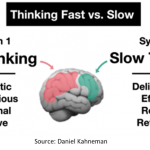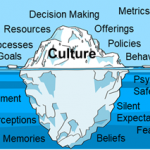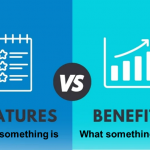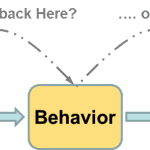Alpine Link Blog

What is the one quality in people you find most endearing when present and most irritating when absent? If you think about those you most admire and spend time with versus those whom you least enjoy spending time with, does one quality stand out? Is it people’s humility or lack of? Or level of empathy and compassion or lack of? Relational engagement vs disengagement? Work ethic? Competence? Open- vs close-mindedness …

Have you ever found yourself stuck in a thought or feeling you knew was unhealthy, but you couldn’t stop it? Maybe you were unable to think of someone more positively. Maybe yourself. Or you couldn’t override a fear or calm an anxiety you knew didn’t deserve the negative energy you were giving it. The most powerful ability we have as humans is the ability to think about our thinking. Yet …

Have you been a parent, a boss, or in a position of influence where you told people what to do? Or in a relationship where you decided or controlled most decisions? Or been in a role or had a habit of lecturing to students, colleagues, or friends? Maybe telling worked for you, or at least you thought it did, but now you’re in rehab. You are ready to move into …

The biggest challenges most leaders face aren’t what they often think. Most say their biggest challenges are related to their people. For sure, leaders often struggle to recruit and hire good people. They constantly work to guide, develop, and retain good people. They give a lot of attention to setting goals for people, tracking people metrics, and holding people accountable. However, many leaders’ biggest challenge is not directly related to …

With as much that is written, discussed, and spent on leadership development, you would think great leadership is the norm. That most everyone in positions of leadership would be considered great leaders with only a few exceptions. Yet, many in positions of influence still don’t get it. They think leading is about commanding, controlling, and having authority. Not only bosses, but too many parents, spouses, and friends think that leading …

What would you do if your email in-box was empty, your voice mail was empty, you had no text messages, there was nothing scheduled on your calendar, there was nothing needing your attention on your desk, and no one asking for your help? What would you do? Given that most people have the opposite problem of juggling too many requests for their time, many people wouldn’t know what to do …

Have you ever felt stuck? Been in a double bind circumstance where there doesn’t seem like a good option on how to proceed? Maybe a job that pays really well but is also really frustrating? Or a relationship that provides companionship and occasional joy, but comes with a lot of conflict and irritation? Or you own a house that you love but requires extensive maintenance? Or a thrilling hobby that …

Many people want to be their own boss and run their own business. Statistics in the United States find that up to 50 percent of people start their own business at some point in their life. Many people who decide to do this, especially later in their career, choose to become an independent professional. This can be working as an executive coach, business coach, or life coach. It can be …

You’ve probably seen the words “faith, hope, and love” on a bookshelf or wall hanging somewhere. Maybe in your own home. Or you’ve seen them mentioned in 1 Corinthians 13:13 in the bible. Hopefully, these words have a positive meaning to you with love possibly being the most meaningful. Love makes life joyful. Being loved and loving others has to be one of the most relevant parts of life. The …

An oft-cited quote in business is “Culture eats strategy for breakfast.” The point being that the influence of culture is stronger than the influence of strategy. That how things are done is more powerful than an organization’s plans. That even great strategies fail if they are at odds with an organization’s capability. That an organization’s ability to execute is more important than its strategy. By the way, this quote is …

Have you ever depended on someone else and they let you down? Maybe they said they would do something and they didn’t. Or they didn’t get it done on time. Or you didn’t get paid. Maybe they said they would support you or help you and they did the opposite—they ignored or betrayed you. For example, you hired a plumber to replace your faucet and instead he flooded your kitchen …

How many organizations have innovation, creativity, or other similar belief in their list of core values? The answer is: most. Yet how many managers really know how to foster innovation on their teams? The answer is: not most. Many managers talk about innovation, but are quick to dismiss people’s ideas. They shut people down. They respond with “We’ve tried that before.” or “That will never get approved.” or simply “That …

How important to you is feeling connected to a community of like-minded people? Maybe a group of people who share a common cause or enjoy a mutual hobby? Or working with people with whom you enjoy spending time? If you’re like most people, belonging to a community is very important. It is the source of many people’s happiness and joy. It is where relationships are formed and experienced. Having a …

When asked “what is required to be successful?” or “what is required to have good relationships?” most people answer “good communication skills.” Of course, right? But what is good communication? What does it take to be a good communicator? Is the skill of good communication based on listening well or speaking well? Using the right words? Not being defensive? Knowing when to use the phone, email, text, or talk in …

Growing up, especially through the teenage years, isn’t easy. Kids between 11-19 years old go through the process of learning to think for themselves, forming their core personality, dealing with hormonal changes, discovering emotions, and developing perspectives they will carry for years to come. Perhaps most formatively, they learn, rightly or wrongly, how to process feedback. They learn their best to deal with peer pressure and bullying. They learn how …

Your past, good or bad, happened. You can’t change it. This includes what happened yesterday, last month, last year, and all the years before. But just because it happened, should it define who you are now? Should you and others use your past as the best measure of who you are today? Our past accomplishments, mistakes, and circumstances are what we and others often think about when considering who we …

What would you say is the primary goal of a parent? If you’re a parent, you know it’s tough to narrow this down to one goal. After all, it is the most important role anyone could have. But wouldn’t it fundamentally be to set your child up for success in their life (based on whatever success means to you and your family)? How about for leaders, what is their primary …

Trust is one of those words that people use frequently without much thought to what it means. Perhaps because the definition of trust is simply having assurance that someone will or won’t do something. But what is required to place assurance in someone? What causes us to be confident that someone’s words and behaviors will happen as expected? Another aspect of trust we might not give much thought to is whether trust …

Have you ever lectured your kids, students, friends, or employees? You’re probably saying “yes, of course I have.” We all have. But why do we do it? Is it effective? No. Studies on learning confirm what we all experience when being lectured. Whether training, teaching, coaching, or correcting someone, telling people what they did wrong, what they need to do, or how to do something isn’t the best approach. Telling …

Most people believe that behavior change is possible. People also generally agree that people can learn, grow, and replace old habits with new ones. This belief is commonly referred to as a growth mindset in contrast to a fixed mindset. However, most people also know that change is hard and just because it is possible, doesn’t mean it will happen. People can change, but it doesn’t mean they will. For …

Most people are innately wired to be in relationships. We are made to be with other people. Yet relationships are often frustrating if not unbearable. At some point, every relationship, personal or professional, has conflict. Some relationships have a lot of conflict. Some end because of it. Many business partnerships fail due to conflict. So do marriages, friendships, and family relationships end as a result of conflict. With conflict so …

Have you noticed the shifts in the workplace in the last few years? You might immediately think about the impacts of COVID, remote work, and video meetings, but there have been other significant changes. If you’ve been in the workplace very long, you’ve undoubtedly noticed them and one in particular. It isn’t subtle. Here is a hint based on the workplace vernacular now in frequent use: Connection, community, and belonging …

If you could spend an hour getting today’s work done or spend the hour making tomorrow’s work better (which includes making the work better for years to come), which would you do? If you are like most people, you think it would be smarter to spend the hour making the future better. You know that a little time spent today making the future better would return your investment many times …

You may not think of yourself as being in sales, but everyone sells. We sell ourselves when trying to get a job, community role, or place on a team. We sell when trying to persuade coworkers, friends, and family to adopt our ideas. At some point, we sell our cars, houses, and other assets. Sales may not be in our title, but the act of selling is something we all …

John was an executive at a mid-size construction company. He had been promoted several times in his 20-year career from which he started directly out of college as a project engineer. John was smart, hardworking, and conscientious about exceeding expectations. Yet John had a career-limiting shortcoming—he had glossophobia. He was fearful of public speaking. He did okay speaking in small informal meetings, but when attending larger meetings, he was quiet …

Do you feel a responsibility to help others in your circle of influence? If you are like most people, you’re probably saying “of course I do”. You care about your friends, family, and colleagues. You want to help them, at least to the extent you can. The question then becomes, in what areas do you feel you should help others? Then the question might be, are you open to helping …

Bill thought his wife Joan spent too much money. Joan thought Bill was too controlling. Yet neither believed it about themselves. Bill didn’t think he was controlling. Joan didn’t feel she spent too much money. Despite being married for years, neither could see themselves authentically. There is a fundamental truth about people: people don’t change unless they are aware of their need to change. And then, many still don’t change …

Success in life comes through many attributes with being an effective communicator at the top of the list. But there is another attribute that may be equally important – self-discipline. In fact, self-discipline may be that which enables people to become effective communicators and therefore deserves to be the most important attribute a person can possess. Self-discipline shows up in various forms. You see it in people driven to succeed …

Ginny was a kind caring mother, but unable to persuade her teenage son not to associate with friends who were bad influences on him. Pete was a highly-regarded subject matter expert in his field, but struggled to convince people to adopt his ideas. Susan was promoted into management, but because she lacked the ability to motivate others, she had to rely on her positional authority to get people to perform …

Have you ever struggled to gain buy-in for an idea? Or to sell a product or service? Or persuade a friend or family member to change their behavior in some way? Or help someone reframe how they think about something? If you think about it, you probably do it every day. If you are in a position of leadership in your workplace, family, or community, you probably spend about 75 …

This will sound like a ridiculous question, but here it is: If someone says they will do something, should they do it? I’m sure you’re saying “Of course they should. If for no other reason, their integrity is at stake.” This seems so obvious why bring it up? Well, how many times have you asked someone to do something, they agreed to do it, and yet they didn’t do it? …

She felt abused and it wasn’t the first time. In fact, it had gone on for months and so finally Julie became so frustrated with John that she had to do something. Her boss, John, was micromanaging her to the point that she was losing her self-confidence and feeling she could do nothing right. She hired a coach to help her figure out what to do. In Julie’s first discussion …

Some people seem to get a lot more done than others. They spend time with their family, maintain multiple hobbies, stay close to their friends, travel often, take on various projects, and perform numerous responsibilities in their work. They seem to check as many to-do list boxes and have as many achievements in a month as others do in a year. People who get a lot done do so through …

Have you ever been accused of being defensive when you tried to provide your perspective in a discussion? Maybe you intended to have a conversation while the other person just wanted you to listen? Or maybe your boss wanted to give you some feedback and didn’t want to hear any “excuses”. Or your spouse wanted you to understand what you did and you responded by explaining why you did it? …

If you are like most people, you consider “stubbornness” to be a negative trait. You wouldn’t want to be perceived as stubborn. It might make you think of the proverbial mule who won’t budge no matter how hard he is pushed or pulled. People who are stubborn are generally closeminded, opposed to new ways of thinking and doing, and generally stuck in their own comfort zone. They are complacent which …

When you are driving your automobile behind another that makes a sudden stop, or an improper turn, which makes you slam on your brakes to avoid an accident, what do you do? Get mad? Send a few choice words or hand gestures their way? Or do you assume the driver made an unintentional mistake and forgive them without frustration? Or in another scenario, if you are a parent or boss, …

There are few absolute truths that are understated more than this one “good relationships depend on good communications.” Of course, good relationships depend on other attributes as well, but people who communicate effectively typically enjoy much better relationships than those who don’t. Or stated more directly, people who have poor communication skills struggle in their relationships. Communication involves talking and listening. It involves managing your own emotions as well as …

If you were shipwrecked and stuck on an island with someone, what type of person would you want to be stuck with? Beyond the obvious answer of being with your mate, family member, or someone with survival skills, what type of personality would you prefer? If you were stuck with one of the following types of people, which would you pick: EgotisticalWhiningAloofNegativeControlling Not a lot of great choices, right? Better …

Have you ever used or heard the phrase “comfort zone” as in “He needs to get out of his comfort zone and try something new”? You probably have, but have you ever thought about what a person’s comfort zone really is? Our comfort zone is a mental boundary in our brains that tells us what is comfortable to do and what isn’t. It is a self-made construct that determines what …

A recent study found that people with a positive outlook were one-third less likely to have a heart attack than people with a negative outlook. Not a surprise. This is consistent with many other studies as well as general psychology and neuroscience. And physical harm is just one negative consequence of being downbeat and pessimistic. In addition to our physiology, our mental health, family, social life, and professional life suffer …

The opposite of a controlling micromanager is the phantom manager. A phantom manager is hands-off, generally disengaged, and rarely available. Phantom managers provide minimal attention, information, or support. They provide little encouragement or recognition. They are largely absent leaving you feeling like you don’t have a manager at all. Have you ever worked for a phantom manager. Or had a phantom friend, child, spouse, parent, or neighbor? You invite them …

Have you ever encountered people who try to control you? They tell you what to do and sometimes how to do it. Maybe you felt so controlled and restricted in what you could do that you felt handcuffed. Or that you couldn’t do anything right. Of course, parents control young children to keep them safe and teach them. Managers are legitimately controlling too when training inexperienced employees. But what about …

Have you ever thought about the basis of your core identity? For example, when you think about who you are, do you first think about your gender, profession, children, hobbies, or possessions? Or do you think about a group of people with whom you want to be associated? Your core identity is based on the characteristics that most define you. It is a reflection of the attributes you give …

Have you ever dedicated time to thinking about what your family needs? Or your friends? Your employees, colleagues, or others who depend on you? You are probably thinking “of course I have.” For sure you have, but is your understanding accurate? Deep enough? Do you really know their true needs? Not what they want, but what they need to be their best selves? If you are a manager, do you …

If there is one people trait that is most counterintuitive, it has to be that people don’t know themselves very well. You would think we know ourselves very well, especially given that we live with ourselves every day. Yet neuroscience finds that most people have very limited self-awareness. Unless we’ve completed and debriefed numerous assessments, worked in a feedback-rich culture for many years, and received sound feedback throughout our lives, …

Do you think more about what is going well or what isn’t? Do you end your day thinking about what you accomplished or what you didn’t? Do you reflect on how fortunate you are or how frustrated you are? Some people require almost perfect circumstances in their life to be satisfied and happy. If they have any problems, conflicts, or adversity, they are not happy. They end their day feeling …

Being a manager isn’t for the faint hearted. Perhaps the only responsibility more difficult is being a parent. Managing and leading people comes with many headaches and challenges. It is a noble profession, but doing it well isn’t easy. The hands-off manager sitting in the mahogany corner office with feet up on the desk is no more. Great managers set the example for others to follow. They ensure work gets …

Most every organization goes through an annual planning process. Many families do the same although normally not as rigorous. Both personal and workplace planning usually includes a financial component. Forecasts are made for income. Estimates are made for expenses and purchases. Budgets are set. Investments are reviewed and planned for. What happens beyond financial planning varies widely from organization to organization. There are at least five different planning philosophies organizations …

Making good decisions involves considering risks, benefits, feasibility, and values, but what if no alternative is clearly better? Have you ever been stuck making a decision to stay with something or move on? Maybe a decision to stay with or leave a job? Or to stick with an existing strategy, vendor, or market? Or stay in a relationship? Or remodel a house? Some decisions are straightforward, but others can seem …

Think for a moment about your most significant life experiences. Maybe a significant achievement or promotion. Maybe an accident, break up, or missed investment opportunity. Or a great trip, successful project, or memorable family outing. If you think about recent formative experiences, maybe one was related to the COVID pandemic. The pandemic created many significant experiences including health scares, financial challenges, and conflicts between friends and family. Everyone has formative …

If you’ve been a manager or parent for very long, you know the importance of delegation. You know you can’t do everything. Getting things done in a family or organization is a team activity, not an individual one. You also know that delegation isn’t as simple as asking someone to do something. Handing off a responsibility to others can be difficult for many reasons. Not everyone is dependable. Some lack …

Have you noticed that people seem to be more stressed than usual? Does it seem that people are quicker to anger than usual? Or that people are more divided and vocal on their opinions? Of course you have and studies confirm what most all of us are noticing. Two-thirds of the US adult population are experiencing stress to a level that their physical and mental health are being negatively impacted …

I was at a gathering of friends recently and encountered two people who were exact opposites in one specific area – the way they communicated. It wasn’t that one was loud and the other soft-spoken. Or that one was eloquent and the other inarticulate. Or that one was passionate and the other monotone. No, it was much more differentiating than that. One individual I’ll call Tom the Talker. He was …

How many times have you tried to help someone learn, develop, or change in some way? Maybe you worked with a friend who needed to better manage his finances? An employee who struggled to meet expectations? A manager who micromanages? A relative who drinks too much? A child who doesn’t do what she is told? A parent who outsourced her self-esteem to social media? How did it go? If you …

There has been considerable debate about the merits of working remotely for years, long before the COVID pandemic which forced many people to work from home. Prior to COVID, studies often found that working from home or a remote location reduced costs and improved individual productivity. And as most know following the pandemic, if they didn’t know already, remote working arrangements offer a degree of flexibility that workers enjoy. People …

If you’ve read much about self-improvement, you’ve undoubtedly heard that receiving feedback from others is valuable. Maybe you’ve heard that “feedback is a gift.” Why is receiving feedback so good? Whether participating in a structured 360-degree assessment, team discussion, or 1-on-1 performance review, feedback increases our self-awareness. Feedback provides valuable insight into how we are perceived by others. We gain awareness into our personality blind spots. We discover a deeper …

Ever thought about how much you communicate? Studies on communication find the average person talks 1-2 hours a day. Most people listen more than twice that. If you add the time people spend on social media, email, and messaging, which is between 5-11 hours a day, we communicate the equivalent of about two books a day. You never knew you were such a prolific author, did you? So, what are …

Have you ever been afraid to speak up in a meeting? Or afraid to give a presentation? Or to receive feedback? Or to accept that something about you isn’t as good as it could be? Or struggle to let go of something from the past? Or frequently need affirmation or attention? There could be many reasons for any one of these conditions, but together they all share a common cause …

Hopefully you’re enjoying a time of prosperity and happiness. But at some point, everyone experiences difficult times. Everyone deals with adversity, personally or professionally. Relationships, projects, finances, jobs, and health don’t always go as we would like. What to do during adverse circumstances has to be one of the questions we most often ask ourselves or those we care about. Whether at home or work, we are often confronted with …

Congratulations, you’ve just landed a new management job. You’ve joined a new firm or received a promotion in your current firm. You are about to meet your new team for the first time and introduce yourself. This is an exciting and important opportunity. You undoubtedly want to make a positive first impression. You hope to start off on a credible and confident tone. What do you plan to say? What …

First impressions are hard to change. So are “first actions”. What you do in your first ninety days after assuming responsibility for a new organization is critical. Your first actions are closely watched by your direct reports, boss, peers, and clients. Your first actions set your tone and planned direction for the organization. Your first actions have a significant impact on the outcomes you expect to produce. What should you …

John was a senior executive at a high-tech company. Like most executives, he was extremely busy and worked diligently to be as productive as possible. He was disciplined in putting everything on his calendar to keep him on schedule. In especially busy periods he subdivided his time into 15-minute increments. He prided himself in getting a lot of work done every day, getting it done efficiently, and avoiding duplication of …

When organizations provide products and services that are wanted in their marketplace, they generally do well. But when market demand drops off, as happens when economies slow down or products become outdated, so do their sales and bottom-line results. What then? Should organizations downsize? Maintain the status quo until demand returns? Or attempt to create new demand? Many organizations give little attention to creating new interest for their products and …

If you could change one aspect of your life, what would it be? What would you change if you had the time, money, self-control, courage, ability, or whatever resources were required? Or think about it this way, what annoyance or issue might you be complaining about that you would like to eliminate? Stop, close your eyes, and think about it for a minute. Dream for a minute. Would you change …

Have you ever wished you were better prepared for something? Like an extended power or water outage? A backup of your computer files? Or a shortage of toilet paper at the store? How about losing your job? As we become increasingly dependent on everything and everyone, people often find themselves wishing they were better prepared. It seems too often that we say “I wish I had known about this ahead …

Having an attitude of gratitude is a well-known cliché. But do you know why? What does gratitude do for people? How important is being grateful? Spoiler alert – if you like experiencing joy, it is very important. Studies find a strong association between gratefulness and happiness. Gratefulness is also correlated with mental health, physical well-being, relationship quality, and employee work ethic. Gratitude is a positive emotion. Couples who express gratitude …

Think of a situation where you want to make a good impression. Maybe interviewing for a job. Meeting a new client prospect. Being introduced to a strategic business partner. Going out on a first date. Or meeting your date’s parents. If you had to choose between two approaches would you: 1) choose to be humble and minimize the attention on yourself? Or would you: 2) choose to highlight your accomplishments …

Patience has to be one of the most confusing and challenging attributes known to humanity. Sometimes it’s good. Sometimes it’s bad. Sometimes it’s neither or both. Generally, patience is considered a virtue. People need to slow down and be still at times. People need to calm down and chill out. However, there are times when patience stalls progress. It prevents achievement. It conflicts with having a sense of urgency which …

Most people have more to do than time in which to do it. Perhaps it has always been this way, but in recent years it seems there have never been so many projects to complete, events to go to, meetings to attend, devices to maintain, applications to use, articles to read, people to keep up with, assets to maintain, and places to go. When we see someone and ask how …

Life is full of challenges. Fortunately, many are inconsequential. But not all. Work, marriage, children, health, friends, neighbors, home ownership, the economy, and government contribute daily to circumstances that can be very difficult. As much as you might try to prevent problems and control your circumstances, problems still arise. No one escapes life’s trials and tribulations. The issue therefore becomes how to deal with problems as much as how to …

What would organizations look like if every manager started their day asking themselves “what can I do to set up my employees for success?” and gave serious attention to developing their employees? Or federal governments if each public servant started their day asking “what can I do today to help my country?” and focused their energy on doing what was genuinely best for the country? Or if parents asked “what …

You may not consider yourself a sales person, but if you are a parent, manager, or person in a position of influence, you should. As you strive to make a positive difference in your family, workplace, and community, you often depend on your ability to influence. You are selling when gaining buy in for your vision and values. You are selling when persuading people to support your ideas and approaches …

Attending college includes “getting through” required courses in areas such as English and social science. Classes like English composition, American history, and introduction to psychology are required even when getting a degree in an unrelated field like engineering or computer science. Hence many students say “I have to complete my required courses to graduate” rather than “I get to complete them.” Note the emphasis on “have to” versus “get to” …

What if you discovered that up to half of your time and money is being wasted? That you are throwing away half of your hard-earned money and working twice as much as you need to? Well, brace yourself. Studies find that people on average do just that and the culprit – poor decision making, especially on decisions with long-term consequences. Have you ever made a major decision? Rhetorical question, right? …

When you think about what you’ve accomplished in recent memory, what do you think about? Do you think about small accomplishments or large ones? Getting through the daily grind or those less frequent but perhaps more life changing achievements? Personal successes or professional ones? Unless you are comfortably retired, you probably work really hard every day which keeps you so busy that just getting through the day is a big …

People think and act based on many influences, but two stand out as more influential than most – fear and hope. Both fear and hope drive us to act in ways we would not otherwise. Fear, for example, drives people to install home security systems and say “no” to risky business ventures. Hope drives people to go to college, start new businesses, and visit exciting destinations. These actions are all …

If you’ve been a manager for very long, you’ve undoubtedly been told to “focus on the behavior, not the person” when giving feedback. I’ve heard it throughout my career, but like so many clichés, it is a bit oversimplified. Actually, it really doesn’t make sense. Isn’t a person’s behavior part of their being a person? At best, this advice is confusing. Worse, it prevents managers, parents, and others in positions …

Great decision makers focus on the problem to be solved before considering solutions. They ask “why” several times to identify the root cause(s) that are most deserving of their attention. The reason—most problems when first encountered are symptoms of deeper issues. When you ask “why do we have this problem” a few times, you get to the root cause. Interestingly, you usually arrive at the same root cause, no matter …

Have you ever taken a philosophy course? I remember looking at college electives and wondering why anyone would take a course on philosophy. What benefit could there possibly be in debating the nature of self, metaphysics, truth, or knowledge? How could that possibly help an engineering undergrad? As the cliché goes, hindsight is 20/20. Not only should I have given philosophy more attention, but also English and speech. The question …

One of the most common concerns workers have is not knowing if their contributions are valued. Many employees work diligently to perform their work, but receive little feedback on how they are doing. Some don’t think about it much until they attend a meeting or receive an internal memo highlighting others who have achieved something noteworthy. Then they wonder if management knows what they do. What was intended by management to …

“Do more with less. Work harder. Hurry up. Drop everything. We need this tomorrow. We’re reducing headcount so you’re receiving this extra responsibility. We’re starting a new initiative in which we need you to participate. You need to be at this meeting. And this one. And this one. By the way, why haven’t you responded to my emails?” If you’re like most professionals in the workplace today, this sounds all …

There has been a massive shift in buyer behavior in recent years. The most obvious example is online buying for which Amazon is the poster child. If you are a retailer, you know the shift very well. Or if you worked for Borders Books, Blockbuster, Toys R Us, Sears, or any one of the thousands of retailers who have gone out of business. Yet, we are at the start, not …
One of life’s biggest decisions is deciding where to work. If you have recently changed jobs or are considering a job change, you know how big a decision it is. Recent data from the Bureau of Labor Statistics shows that the average US employee works 8.06 hours per day. Many people work much longer making work the place where people spend most of their discretionary time. If for no other reason than …
Have you ever asked “why can’t people just get along?” Or thought about all the conflict that occurs in life? By some estimates managers in the workplace spend 20 percent of their time dealing with conflict. When you add in the time managers spend overcoming differences of opinion, that number goes up even higher. At home, couples and parents spend comparable time in disagreement. One study found that couples argue …
As part of the family of human beings, know that despite your difficulties – you matter. You have a name. You are an important person. You are loved. There is reason to have hope. You may not think about much other than what you need to do today, or perhaps even what to do to survive, but please take a few moments to read this and reflect on what you …
Some people like structure in what they do. Some don’t. Those who don’t say structure inhibits flexibility and creativity. Structure doesn’t accommodate unplanned requests and urgent matters. Structure is no longer appropriate for our contemporary society described as volatile, uncertain, complex, and ambiguous (VUCA). They say “structure is no fun.” In contrast, those who like structure say it provides consistency and repeatability. It prevents many of the urgent matters and …

Everyone likes heroes. They make for great movies, stories, and sporting events. They are responsible for successful startups. They give captivating publicity to cities, organizations, and even countries. They provide great endings to otherwise not-so-great circumstances. In the workplace, however, they are not always so great. The problem is when an organization becomes dependent on a single person or few people. What does it do to the rest of the …
Having self-esteem is fundamental to being mentally healthy. Being self-assured is at the core of success at work and home. Self-esteem and self-assurance, like self-confidence, are good qualities. However, don’t confuse them with arrogance or feeling superior to others. When you have a healthy self-esteem, you feel good about yourself. You don’t require external validation. You don’t feel the need to boast. You believe in yourself and your abilities, but …

The traditional approach to accounting and financial management doesn’t account for all of our assets such as the value of our knowledge, experience, network, and future earnings potential. Neither does it account for all of our liabilities such as our unknown and unresolved issues. Whether accounting for our individual issues or organizational ones, we can have significant but unreported debts. For homeowners, this debt is the accumulation of repairs that …
Would you be concerned if you bought a house that was only built to last five years? Yes, of course. You buy a house with the expectation it will last forever, or at least as long as you own it. What about purchases that go into your home? Do you expect dishwashers, microwave ovens, faucets, and smoke detectors to last a long time? Or weed eaters, coffee makers, DVD players, …
Ever thought what life would be like if there were fewer hours in the day? What if there were only 22 hours in a day and the standard work day was six hours? What would you change, give up, or do less of? Or what if there were more hours in a day? What would you do if you had an extra two hours every day? Give yourself some downtime? …

One of the most complicated responsibilities managers have is the empowerment of their employees. Employees want to be empowered to do their jobs, yet many managers feel the need to control their work. Some managers even withhold the work. For those managers who do delegate work, many then struggle with how to follow up. For good reason, the level of independence granted employees is a common struggle and source of …

There is a significant difference between people that is obvious when you look for it, but not so obvious when you don’t. It shows up in conversation, but often doesn’t produce conflict until people start working or living together. The difference is people’s preference for detail. Some people love detail. They pour themselves into the minutia of life. They describe things with great specificity. When at work, they create data, detailed …
Of all the many factors that impact an organization’s performance, studies consistently find an organization’s leadership has the most impact. So, for good reason, leadership development receives a lot of attention. Many books, seminars, and other resources target leadership development. Yet, the quality of leadership shows little improvement from year to year with many studies finding year-over-year declines in the quality of leadership in both the private and public sector. There …
What bothers you? What do others say or do that upsets you? On what topics are you most easily offended? Maybe it takes a lot for someone to offend you, but at some point, on some topic, everyone becomes offended. Everyone dislikes and gives a thumbs down to something. Upsetting offenses range from minor grammatical mistakes and erroneous pronoun usage such as people saying mine instead of ours to more …
What drives you? What do you want to accomplish? What are your critical needs? These may be the most basic and crucial questions we can ask ourselves yet the most neglected. Much has been said about human drivers, needs, and desires. For good reason. Everyone has them. Abraham Maslow’s hierarchy of needs is perhaps the most used example which depicts basic needs such as food and shelter at the bottom …
A rhetorical question would be asking if you want to be part of the problem or solution in the New Year. Just like it would be to ask if you want to be successful or not. Yet as obvious as those answers are, half of the population will perform below average. Many will create more problems than will solve them. While few people plan to be worse off, many people …

The attributes used to describe people number in the tens of thousands. So too are the ways that people can succeed and fail. Unlike math, there are few absolutes when it comes to the competencies required to be successful. Yet there is one attribute that regularly shows up at the top of the list of successful people – the willingness and ability to challenge the status quo. People who challenge …
Do you have capabilities you don’t use? Or know about? Bob did. As obvious as it was to an outsider, he didn’t see it. Instead of using his capabilities, he lowered his sales forecast. So did Becky. Rather than use her capabilities, she incurred significant expenses that could have been avoided. What do Bob, Becky, and many people have in common? They don’t leverage their external resources. When you have …
What is a fundamental difference between successful people and very successful people? Hint: It is the same difference between people who make a few mistakes and those who make many mistakes. Answer: Their willingness to take action. People’s successes as well as their failures are often rooted in a “let’s do it” mentality. People who start new businesses, launch new products, create new offers, and take risks give them themselves …
A common topic in the workplace is employee performance. Most companies formally assess employee performance at least once a year, but conversations about performance occur daily. Some are positive discussions about people exceeding expectations, but others are about people falling short of expectations. Regarding the latter, you hear comments like “he just doesn’t get it”, “she always makes mistakes”, or “he doesn’t have the skill we need.” Yet, as important …

Controlling your mind isn’t for wimps. Trying not to think about something is almost impossible. For example, if you have financial challenges, how do you tell yourself not to think about your financial challenges? Or health issues? Or family, work, or relationship problems? Everyone experiences frustration, fear, anxiety, or worry, but that doesn’t make it easy. Putting something out of your mind that is disconcerting is very difficult, especially for …

Ever thought about your peak potential? In other words, how much impact you can have, money you can make, or capable you can become? It could be in terms of leading an organization, raising great children, winning an award, creating a product, or making the world a better place. People with ambition think about their potential. They strive to achieve. They have ideas, set goals, and pursue plans which move …

Careers generally go in two directions – mastery or management. Either you focus on a domain and work toward being a respected subject matter expert or you pursue management and work your way up the proverbial corporate ladder. Which is better? Which pays more? Which adds more value? Which is more satisfying? Many people believe they must take on the management career track to grow in responsibility, compensation, and respect …

Most phone conversations start with “How are you doing?” and the frequent response is some variation of “I’m extremely busy.” At no point in human history have people had so much to do and keep up with. People are straining to get everything done at work, home, and even in their “time off” when on vacation. Stress, lack of sleep, poor fitness, bad nutrition, and related medical conditions such as …
Ever been part of something that started out with a bang, but ended with a bust? Maybe a dream job turned out to be a dud job. Or a promising investment turned your principle into a pittance. Or your company equity stock became penny stock. Or you purchased something with all the features you wanted but in the end sold it for junk. Why do relationships, jobs, investments, and things …
Ever made a mistake? A really big one? Maybe you did something careless, without proper planning or sufficient attention? Something that might have cost you dearly in some way like a job, sale, time, money, health, or a relationship? Unless you were just born, you surely have. So, the more important question is “are you better off as a result?” As painful as mistakes can be, they can provide great …

Opposites attract because people are pulled like a magnet to traits that are refreshingly different from their own. But those differences often become the source of disagreement. Studies find that while people are intrigued and attracted to others dissimilar to themselves that over time opposites don’t stay together. Whether personal or professional, diversity is good, but only to a point. Having teams, friends, and spouses with differing perspectives and capabilities …
In mafia movies, most everyone who associates with sordid people end up dead or in jail. Even in more normal daily life, people who hang out with the dastardly rarely get to enjoy a peaceful retirement. They end up hurt, bankrupt, or worse off in some way. So it seems obvious that associating with people of dishonorable character is a bad idea. Yet everyday people join forces with terrorist groups …
The corporate mantra for the last few years has been “do more with less” with the idea being that people need to be more productive and get more accomplished with fewer resources. How has this worked out? The United States Department of Labor reports that non-farm business-sector productivity rose 0.4% annually on average from 2007 to 2015 with 2015’s annual growth at 0.2%. In contrast, productivity in the late 1980’s …
How often are people told they are an organization’s most important asset? If an organization is smart, they say it often. But saying it doesn’t equal doing it. Nor is there agreement on what putting people first means. So many managers talk about people being important, but do little to truly care for and nurture them. Surveys on employee engagement consistently find that two-thirds of employees are not engaged. The …
In years past, many companies and their sales people relied on selling tactics to sell their offerings. They conveyed rehearsed value propositions. They gave away logoed items to promote their brand. They processed their client prospects through scripted sales systems. In some cases, they employed clever if not aggressive closing tactics such as “if I can show you a car you like, will you buy it today?” To be fair, …
Making good decisions involves considering risks, benefits, feasibility, and values, but what if no alternative is clearly better? Have you ever been stuck making a decision to stay with something or move on? Maybe a decision to stay with or leave a job? Or to stick with an existing strategy, vendor, or market? Or stay in a relationship? Or remodel a house? Some decisions are straightforward, but others can seem …

You’ve experienced it before, probably in the last few days, either with people at work or family at home. Someone says or does something that offends someone else. A disagreement ensues. After both parties become embroiled in the conflict, who started it and often the reason are long forgotten. From an outsider’s perspective the cliché “it takes two to fight” comes to mind and both parties are deemed equally at …
What do studies of successful people consistently find to be at the root of their success? Intelligence? No. Creativity? No. Efficiency? No. Finance or other domain skills? No. While these and many other capabilities are important, they pale in comparison to people skills. People with the best interpersonal skills are the most consistently successful in life. People who are able to build relationships, work collaboratively with others, and gain buy-in …
When selecting your partners, employees, friends, or mate, what do you look for? When considering offers of employment or building new friendships, do you have specific criteria in mind? Do you follow a selection profile when recruiting or being recruited? Having a definitive selection profile is almost impossible as there are thousands of attributes used to describe the people you might want to hire or spend time with. People can …
How many times have you been told that goals are important to your success? Probably hundreds if not thousands of times. You’ve heard it from bosses, trainers, spouses, and parents. You’ve heard it from management gurus, motivational speakers, consultants, and coaches. You’ve likely been advised to make your goals SMART – specific, measurable, agreeable, realistic, and time-specific. With so much attention to goals, you probably have myriad metrics, measurements, leading …

Have you ever received bad advice? Or worse, acted on it? Been given information that hurt more than it helped? Perhaps you hired someone based on a referral who fell short of expectations? Or pursued a sales opportunity that merely wasted time? Or started a relationship that ended with a thud? Or ended a relationship that you wished you would have stayed in? Or made a bad investment? Or cut …

When is it time to give up on something? When do you stop pursuing a customer prospect, investing resources into a project, or striving to earn a promotion? When do you walk away from a negotiation or quit trying to make a relationship work? Do you give up when you get frustrated? Or when you’ve tried everything you know to try? Or when a better option becomes available? How do …

What do managers routinely do that frustrate their employees? And parents do that frustrate their children? And spouses do that frustrate each other? One of the most common frustrations people experience is being told what to do. Kids get really tired of their parents telling them what to do. Hence, kids leave their stuff all over the house despite being told hundreds of times to pick it up. Employees get …

What is the most critical skill to people’s success – personally or professionally – yet also the most elusive? Time management? Strategic thinking? Discipline? Decision making? No. While these are important, they pale in comparison to communication skills. Attentive listening, asking relevant questions, showing empathy, and knowing how to handle difficult communications are the most critical to success. They are vital to building healthy relationships, exchanging ideas, sharing feelings, gaining …

Have you ever been in a conversation when someone said something inaccurate, you corrected them, and then they became defensive? Or you pointed out a colleague’s shortcoming and discovered later they stopped talking to you because of it? Or you tried to help your spouse improve in some way which created hurt feelings and an argument? These experiences will cause you to quit giving corrective feedback, but is silence the …

Have you ever had to take a step backward in your career, perhaps accept a lesser position or lower compensation? Or a step backward in a project to rework something? Or a step backward in the marketplace—deferring a near-term opportunity in favor of a longer-term one? Or a step backward in a relationship where you needed to spend less time with or stop seeing someone for a period of time? …

When you think about what impacts your job performance and your professional development objectives, what do you think about? Performance and ongoing development for most people are based on two categories of skills – soft skills and hard skills. Soft skills are general skills that apply regardless of role or position such as communicating effectively, working productively, and thinking strategically. Hard skills are role and domain specific skills such as …

Have you ever thought about how much your attitude depends on your circumstances? For example, does your happiness depend on how much praise you receive? How much money you have? How organized and controlled things are? How well your children are doing? Or do you stay upbeat regardless of your situation? How about your character? Does the degree to which you are completely honest depend on your situation? Do your …

When you think about what makes life enjoyable, what do you think about? Your family? Friends? Hobbies? Faith? Fulfillment from work? Satisfaction from helping others? Or is there something more fundamental that gives you joy? When you are away from your family, but pause to think about them, do you smile mentally if not physically. Why? While you may not be with them, you know you have the opportunity to …

Are you quick or slow to take action? Consider there are two types of people in the world. There are those who are bold and action oriented. Then there are those who are reserved and measured. The former are quick to decide often preferring to leave the implementation details up to chance, or leave them up to others to decide. The latter are more concerned about how things get done …

Regardless of a company’s product, service, market, or industry, there is competition. For most companies, competition is fierce and intensifying. Adding to the threats from rival competitors are ever more demanding customers. Customers armed with multiple supplier options continue to ask for more. They want more services, features, and attractive terms, yet often don’t want to pay more. External partners and suppliers too are problematic for many companies. Partners who …

If you think about where organizational learning budgets and resources are allocated, the area that generally comes to mind is training. The design, development, and delivery of training receives much of a learning organization’s attention. Yet there are two other areas that have just as much of an impact on the effectiveness of organizational learning – what happens before a training program and what happens after. Activities prior to a …

Should you or your colleagues at work understand profit even if you aren’t measured on it? Should employees at all levels care about your organization’s profitability? Does having an understanding of finances help employees make the right decisions? Of course the answers are “yes”. Ensuring financial profitability is everyone’s responsibility. The organization you work for is only successful if it makes more money that it spends. It is only a …

Have you ever attended a self-improvement themed seminar and wished that someone else who needed to hear the message could have been there with you? Or sat in a religious service and thought about someone else who needed to hear the sermon? Or read a self-help book and wished someone else would read it too? We often hear helpful insights, but think about how they apply to others, not ourselves …

You accidently glimpse inside a coworker’s bag and see a knife—what do you do? You hear your company is merging with another company—what do you think? Your wireless network connection stops working—do you get upset or do you start troubleshooting it? Your colleague sends an email that could be interpreted as complimentary or derogatory—which way do you interpret it? These and thousands of other circumstances present themselves to you every …
One of the hot topics in business today is data—leveraging the massive amounts of information stored in IT systems to spot trends, identify opportunities, detect problems, and make better decisions. This topic is often referred to as “big data”, “data analytics”, or “business intelligence”. This is a promising area, particularly for companies with lots of data, in helping improve strategy formulation, employee productivity, employee engagement, product development, sales, and overall …
One of the most popular management approaches to improving organizational performance is reorganizing. If you’ve been in the workforce for more than a couple of years, you’ve undoubtedly been part of an organizational restructuring. Managers regularly restructure their organizations in an attempt to improve efficiency, scalability, and accountability. Whether keeping up with change or fighting complacency, restructuring is commonplace. Even when companies are enjoying success, many managers reorganize anyway. They …
Have you ever been part of an organization where the path to getting work done was more like a dirt road with potholes than a high-speed freeway? Where obtaining approvals, reaching decisions, and achieving desired outcomes were needlessly slow. Maybe departments competed with each other rather than helped each other. Perhaps drama, politics, and bureaucracy displaced value adding activity. Or best practices weren’t defined or followed. Or responsibilities, expectations, processes, …
Do you generally communicate at a detailed level or high level? Given your role, should you typically talk in general terms or specifics? The answer of course is that it depends, but many people apparently don’t know what it depends on. Have you ever attended a seminar where the speaker stayed at such a high level that you didn’t learn a thing? Or been in a meeting with a subject …
Have you ever thought “I need to find another job.” Or had one of your top performing employees find another job? If you’ve been in the workforce very long, of course you have. Everyone gets restless at some point. People get tired of doing the same task or job on a repeated basis. People lose interest in what they do or who they work for. They want to try something …
Experts who track the world’s body of knowledge claim that it took from 0 A.D. to 1500 A.D. for the world’s prior knowledge to double. Now, with advances in technology and the proliferation of content on the Internet, they claim that the world’s knowledge is doubling every year. They forecast that by 2020, the world’s knowledge will double between every 10 hours to 10 weeks depending on whose forecast you …
When you think of something being done, i.e. completed, what do you think of? Do you think of a project where the bulk of the work has been performed or one where all of the work, including post-project clean-up and documentation, has been completed? Do you think about the unseen details being taken care of or just the visible tasks that support the tangible project outcome? You might have a …

Are you mentally tough? What are the attributes of mental toughness? No matter how difficult or urgent the problem, people who are mentally tough remain focused on solving the problem rather than becoming stressed out by it. They give their attention to taking action rather than feeling anxious and overwhelmed. Does this mean that being mentally tough prevents people from being sensitive and caring? In other words, can mentally tough …
People’s success depends on two broad categories of skills – hard and soft. Hard skills are technical abilities that relate to specific occupational domains such as engineering, marketing, finance, or construction. They are called hard skills because they are specific, tangible, and often observable. Soft skills in comparison are less tangible and not specific to any occupation. They include competencies such as strategic thinking, problem solving, planning, organizing, maintaining self-control, …
Which is more important—having a great idea or being able to communicate your great idea? Building a great product or being able to sell your product? Making valuable contributions or gaining unpretentious exposure for your contributions? Being an engineering manager with deep engineering expertise or having the ability to rally your team behind a new development initiative? Having great ideas, expertise, products, and contributions are tremendous assets, but aren’t sufficient …
Successful people are action oriented. They are quick to seize opportunities and solve problems. They are decisive and responsive. To the more risk aversive, they appear reckless at times. They are perceived to “ready, fire, aim” as if they haven’t properly planned their actions. Yet people who are successful over the long term also know when not to take action. Like seasoned leaders, they can be patient and still. Successful …
Unless you are a trained therapist, you’ve probably never heard of the DSM-5—the Diagnostic and Statistical Manual of Mental Disorders, Fifth Edition. It is the 2013 update to the American Psychiatric Association’s classification and diagnostic tool for mental disorders. In the United States, the DSM serves as the primary authority for psychiatric diagnosis. It is used frequently as studies find that 50 percent of adults have a diagnosable mental disorder …
You might think of money as your most precious resource, but in the coming year I hope you’ll think of something else – your time. If you are like most, you are focused on making money, but recognize that money is a resource of secondary importance. Time is your most important resource. How you spend your time determines how much money you have and much more. How you spend your …
When you think about advancing your career, what do you think about? Do you think about climbing the proverbial corporate ladder? For many people, career advancement is based on accepting higher levels of people management responsibility. Organizations often characterize promotions in terms of the number of people being managed. Yet not everyone wants to manage people. Nor should they. Some of an organization’s most valuable and influential contributions don’t come …
Do you consider yourself structured or unstructured? Do you appreciate processes and systems or do you prefer flexibility and the freedom to do what you want when you want? There are clear advantages to both preferences, but the perspective I hope you’ll have for the next few minutes is that processes and systems are valuable to your success because that is this article’s topic. To be clear, like most people, …
When you think about what works well in your organization, what comes to mind? Are you most proud of your ongoing product innovation, top-quality customer service, or harmonious teamwork? How about what doesn’t work so well? Is it your slow approval processes, lack of sense of urgency, or inability to obtain higher margins? You can undoubtedly create a list of what you like as well as what you don’t like …
Have you ever had a coach—in business or sports? If so, did your coach help you or your team take your performance to a higher level? If you are like most people, you’ve benefited from a coach in some way. If you are at the top of your game, you’ve probably had a coach who helped you get there. There are few CEOs, actors, musicians, or professional athletes who haven’t …
Have you ever set a goal, but failed to achieve it? Whether a professional goal like achieving a sales quota or a personal goal like improving physical fitness, most people have struggled at some point to achieve the results they set out to achieve. People aspire to deepen their industry knowledge, learn how to read financial reports, play a musical instrument, or improve their speaking skills, yet year after year …
Most organizational successes, as well as failures, have their roots in a single common denominator. This is not to say that there aren’t many variables involved including the efforts of many employees, but there is one consistent element at the core of all organizational activity, and performance shortcomings in particular. While on the surface many problems seem due to product deficiencies, poor service levels, inefficient processes, outdated systems, or failed …
Companies, organizations, and government agencies make significant investments in leadership development, yet leadership performance continues to set new lows. Studies find that two-thirds of the population lacks confidence in their public leaders. Three-fourths of the population thinks corporate corruption continues to increase. Over half of employees consider their bosses to be below average leaders with many surveys reporting approval ratings as low as 10 percent. Two out of three employees …
If you’ve attained a significant position of responsibility you’ve undoubtedly performed well in many ways. You’ve worked long hours and kept going when others would have given up. You’ve made decisions, put yourself at risk, and taken actions that few others had the courage to take. You pursued goals that others thought were foolish and made many mistakes along the way. These and other aspects of what you did are …
When we attend staff meetings, planning meetings, and business reviews, we inevitably leave with a list of actions to put on our to-do list. We are generally good at figuring out what we need to do and putting plans in place to do them. The problem is that our to-dos often exceed our capacity to do them. When we add up all that we hope to accomplish, we end up …
I’m intrigued by how congress confirms presidential appointments. When the president nominates someone for a cabinet position such as Secretary of Defense, congress reviews the nomination and votes to confirm or reject the appointment. In their review process, congress often subjects the nominee to intense questioning that more closely resembles an interrogation than an interview. As part of the confirmation process, congress reviews the nominee’s background and track record. When …
I’m fortunate to work with many top performers and great leaders. One trait I consistently find in successful people is their desire to learn and develop. Top performers continually set and pursue personal development goals. They make self-improvement a top priority. They not only perform their day-to-day responsibilities but also take time to invest in their ongoing development. They know if they aren’t developing, they’re falling behind. They know their …
It seems to be the norm these days for people not to take responsibility. It may be premature to announce the death of responsibility, but whether in the workplace, government, or home, people too often avoid responsibility. Employees, politicians, neighbors, bosses, doctors, police officers, teachers, and our own children regularly avoid taking responsibility. There are countless reasons and excuses ranging from avoidance of legal liability to laziness, but what many …
Studies on Internet usage report that two out of three people actively use social media. Average usage varies between 30 minutes to four hours a day depending on the demographic you look at. Social media has clearly reached critical mass and become a way of life for many people. You find people checking their favorite social media applications everywhere—at the supermarket, on the train, in the car, and I can …
You know your physical fitness is important, yet you struggle to find time for regular exercise. You know your diet is important, yet you can’t resist fast food or unhealthy snacks. There is little more important to you than your health, but you do little to improve it. If this is you, you have many companions. Studies find that for two out of three adults, this is their daily battle …
My second-oldest daughter, Angela, recently married. Several people have asked me what I said when giving my toast to the bride and groom. In my toast, I talked about the importance of giving verses getting. Giving is a timeless principle that always gratifies and delights, yet is easy for spouses to forget—especially in our “me society” that focuses on what we want. Giving not only makes for good marriages, but …
It’s great to have friends and fans. Friends and fans make life enjoyable. They provide companionship. They give support and encouragement. They make you feel good about who you are and what you do. But no matter how likable you are, not everyone who knows you is a friend or fan. You eventually encounter a neighbor who doesn’t like being your neighbor. You have conflict with a coworker. A customer …
